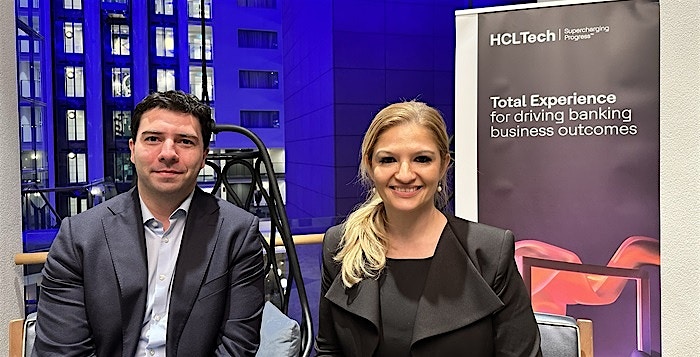At Handelsblatt’s BankenTech conference in Frankfurt, where HCLTech was a Premium Partner, Nadine Methner, Head of Business Banking for ING Italia and General Manager for ING Deutschland, discussed the transformative trends in digital banking, the role of AI and data and how business banking can simplify and empower SMEs across Europe.
Digital banking is far from reaching its full potential in Central European markets. As Methner observed, it is “still very young in its age.” While advances in technology have transformed customer experiences, there remains a pressing need to enhance them further.
“When I look at customer journeys, can we make them exciting enough? Can we make them fast enough? Can we make them seamless enough?” asked Methner. For the banking sector, this means designing processes that are intuitive and transparent. Whether it's personal banking or business banking, simplicity and trust are the pillars on which innovation must be built.
Unlocking the power of data and AI
Artificial intelligence (AI) and its subset, GenAI, are rapidly reshaping banking, but the technology’s application is still in its infancy. Most banks are using AI for basic functionalities like conversational chatbots or rudimentary customer support, but the technology’s potential extends far beyond.
“We're just at the beginning of harnessing AI technologies in the banking and financial services industries, and at the same time, AI is rapidly accelerating the development of new tools that we can utilize,” said Methner.
In the business banking space, AI is evolving from simply improving customer interactions to offering powerful insights derived from data. AI's most transformative potential lies in harnessing vast amounts of data to make decisions in real-time. For example, AI can analyze transaction histories, behavioral patterns and market trends to offer personalized banking solutions or identify emerging risks. This includes the development of “financial, lending and regular payments products.”
Leveraging data in this way allows businesses to receive more accurate financial advice and better-targeted products, enabling them to act quickly and strategically in a fast-paced economy.
Beyond just customer service and loan offerings, AI and data analytics can also revolutionize areas like fraud detection, regulatory compliance and credit risk assessment. AI algorithms can sift through large datasets and identify patterns that would be impossible for human analysts to detect, providing more effective fraud prevention systems and reducing the time spent on manual checks.
However, with the increased use of data comes a heightened responsibility to ensure transparency and safeguard customer privacy. “Clients want to know what happens to their data once they provide it, share it, and disclose information. How it will be stored, whether their consent is required, and what happens to that consent are key concerns,” said Methner.
In response, banks must not only leverage data for innovative solutions but also adapt to evolving regulations and communicate clearly with customers about how their data is being used. Transparency around data usage, regulatory changes and security measures is crucial to fostering trust in AI-driven solutions. This requires a balance — banks need to deliver personalized, data-driven services without compromising the privacy and security of their clients.
Simplifying complexity and lending for businesses
Europe is home to millions of small and mid-sized enterprises (SMEs) and digital banking plays a central role in supporting these businesses across key markets.
One of the biggest opportunities in digital banking lies in supporting small and medium-sized enterprises (SMEs) with the complexity of traditional financial services.
“Especially in business banking, where complexity is high, small businesses, self-employed individuals and entrepreneurs often don’t have the time to go through pages of fine print. They simply want access to a loan, a daily banking service or account, and sometimes quick advice or relevant information at their fingertips,” said Methner.
With advancements in data analytics, AI and digital banking, banks can now also offer real-time, data-driven decisions for business loans, allowing SMEs to access the capital they need faster than ever before.
“"Business banking is not only about lending, but also about enabling businesses to grow, expand, and become more efficient. It's about supporting them in driving e-commerce solutions and helping them secure faster financing to expand their supply chains,” explained Methner.
This emphasis on quick access to financing for SMEs is especially relevant in Europe, where businesses often face hurdles in accessing traditional loans. By leveraging data, AI and digital channels, banks can streamline the lending process and offer businesses the financial flexibility they need to seize growth opportunities.
Simplified onboarding processes, easy-to-use platforms and transparent, tailored products can significantly reduce the administrative burden for SMEs, empowering them to focus on growth.
Leveraging data for ESG goals
Sustainability is another area where data and digital banking intersect. Methner mentioned how ING is focused on supporting SMEs in their journey toward sustainability, specifically in the context of ESG (environmental, social, and governance) factors. This is particularly important for European businesses, where regulations around sustainability are becoming stricter and there is a growing demand for greener solutions.
“We also focus closely on ESG, examining how we can assist small and mid-sized companies in their transformation towards greater sustainability, both for their own businesses and for the broader economy, ultimately benefiting society as a whole,” said Methner.
As European businesses strive to meet sustainability targets, digital banking solutions that leverage data can play a crucial role. AI and data analytics can help businesses track their environmental impact, optimize resources, and even gain access to financing that aligns with their sustainability goals. This approach not only supports businesses in meeting regulatory demands but also helps them stay competitive in a market that increasingly values sustainability.
ING’s role in driving banking innovation
Looking ahead, the future of business banking in Europe is undeniably digital, driven by the power of data, AI and a growing focus on sustainability. As digital banking evolves, banks must not only innovate but also build trust, prioritize transparency and safeguard customer data.
Commenting on the importance of ecosystem partnerships in helping deliver ING’s business goals, Methner said: “Having trusted partners is crucial in this journey. In a partner we look for deep domain expertise, a relentless focus on delivery excellence, and the ability to collaborate closely to drive innovation, improve operational efficiency, and ensure sustainable growth in an increasingly competitive market.”
As a leader in digital banking, ING is actively contributing to these advancements by creating tailored financial services for SMEs, supporting ESG transformations and leveraging AI to create secure, personalized solutions.
Methner concluded by sharing how the bank is focusing on simplifying business banking and enhancing accessibility across European markets. “We must offer easily accessible digital products, simplify customer onboarding, and focus on how technology can enhance products, making them better and easier to manage.”






